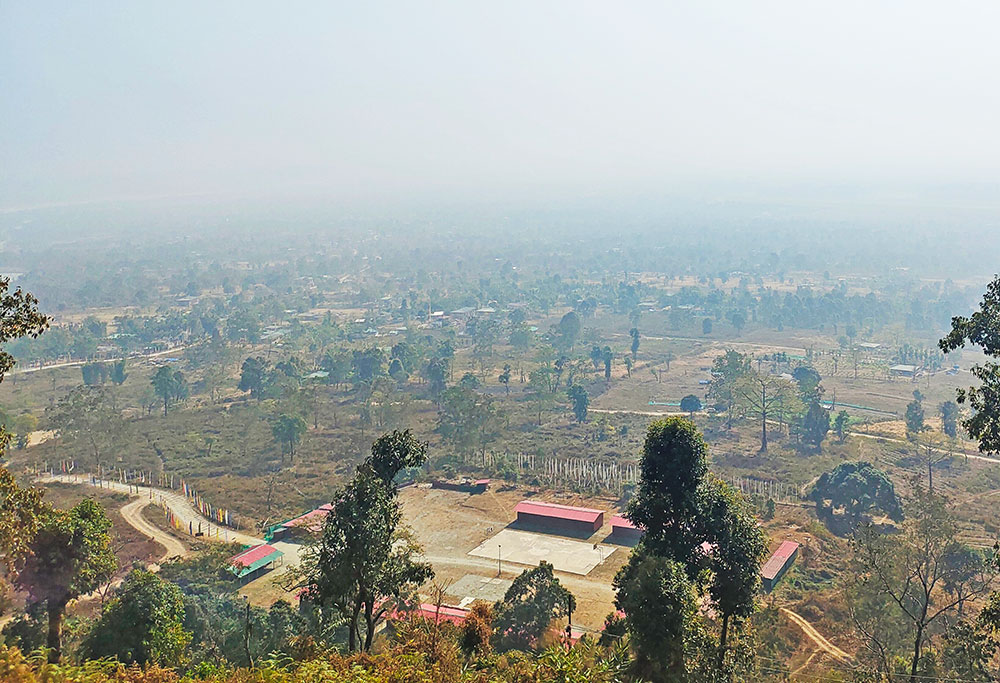Lhakpa Quendren
Gelephu — As a young boy, Karma Tenzin didn’t know what would happen to his family when he accompanied his father and the rest of the family to Dechenpelri village in Gelephu in the fall of 2003. Given the security concerns, villagers of remote Edi village in Phangkhar gewog, Zhemgang, were resettled in Dechenpelri, a fertile slope located seven kilometers from the Gelephu town.
Edi and other villages in Zhemgang were frequented by armed militants who made the villages a common route when moving from Pangbang to Nganglam. Concerned with the safety of the villagers, the villagers were safely resettled, despite their resentment, to Gelephu. Each household was given three acres of land as Soelra.
The villagers call their new home with the same name – Edi, although it is Dechenpelri officially. It is the first village in sight from the viewpoint above Fulari where a landmark water project was recently inaugurated. Seeing convoys of cars rushing up and down recently, and now aware of the Gelephu Special Administrative Region, the once farmers of remote Edi are waiting to reap the opportunities of Gelephu’s transformation.
Karma Tenzin is now the village Tshogpa. He is thanking his stars and His Majesty the Fourth Druk Gyalpo for resettling them in Gelephu and His Majesty The King for coming up with, what he calls a visionary plan for the country that he could have never dreamt of.
Karma Tenzin is aware that the planned “mega city” as he puts it, will change the lives of farmers in Dchenpelri and beyond. “The city project is expected to bring various opportunities and hopes for farmers, including potential avenues for enhanced agricultural practices, increased market access, improved infrastructure, and diversified economic activities,” he said.
Karma Tenzin, as the village Tshogpa now, has convinced his fellow villagers about the impending changes and the prospects. Nedrup Tshomo, a 33-year-old mother, said that the project would provide opportunities for agricultural produce and employment for both youth and adults. “I hope that even farmers like us can find employment based on the skills that we possess.”
She said that all of them, farmers in Sarpang included, are excited with the plan. “Communities around the city will have a huge market for all our products,” she said with excitement in her eyes.
Edi villagers are today challenged by human-wildlife conflict, lack of market and economic prospects. Many residents believe that the development of Gelephu Mindfulness City as a Special Administrative Region would provide them business and commercial opportunities without having to toil in the farms.
A senior citizen, Jambay Tshering, said that the main concern among the residents was the limited availability of land. “We have always wished to have more land because the land size is getting smaller as it is fragmented among family members.”
Today, out of the total 49 households, eight households still live in temporary shelters and are facing budget constraints for house construction. The Tarayana Foundation provided financial support of Nu 100,000 per household for house construction.
Many are regretting parting with a portion of their land. “We didn’t have any source of income to build houses and resorted to selling land. This is the biggest regret in my life,” said a resident.
After nearly six years of negotiations with separatist groups from Assam and West Bengal to vacate their camps in southern Bhutan, the government tried to relocate the Edi residents to Sarpang in 1998 and 2000. However, the people refused to move with some complaining about relocating from one dense forest to another (Dechenpelri was an inhabited forest land then).
In October 2003, all 41 households from Edi and nine households from the nearby village of Subrang were moved to an evacuation camp in Lekithang, Gelephu. The entire community resided together in temporary shelters for nearly three months until the successful completion of the military campaign in December.
They were later resettled in what is now Dechenpelri.


